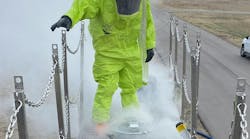Decade After VA Firefighters Battled Jet Crash Blaze, Cancer is Their Latest Enemy
A decade after five Virginia Beach firefighters battled the flames after the crash of a Navy FA-18, they have something else in common -- cancer.
The fire was dubbed the "Good Friday Miracle" as all the souls aboard as well as those in the apartment complex the jet hit survived.
While no one can say for sure that the crash is the culprit behind the cancer diagnoses, the toxic brew that filled the air and littered the ground that day was extremely hazardous, according to an investigation conducted by 13NewsNow.
"There is a handful of us who have developed some type of cancer and we’ve all been to the jet crash and that’s pretty eye-opening,” said Capt. Chris Isdell, who was also diagnosed with non-invasive follicular thyroid cancer in September.
Surgery successfully removed the cancer in the 31-year-old, who was a rookie at the 2012 fire.
"It was taken care of with just surgery, didn't have to do any kind of treatment, it's just going to be constant monitoring and scans," he said.
Virginia Beach Chief Kenneth Pravetz told reporters: “When things burn, it’s a whole different game. You know, the chemicals were there when it started, but when things burn, the carcinogen effects of the chemicals and the burning and the meltdown, it creates complex new chemicals that you really don’t understand."
Capt. Matt Chiaverotti, 44, was diagnosed last summer with late-stage anaplastic thyroid cancer, a rare disease making up 1% to 2% of thyroid cancer cases.
It's taken its toll and sometimes he doesn't have enough energy to get out of his recliner.
The department has been spearheading safety improvements in the years since the crash, “We’ve gotten second sets of turn-out gear. The hoods we wear now actually have a barrier in them now to protect our necks," Chiaverotti said.
Virginia Beach Professional Fire and EMS president, Max Gonano, who has been leading the charge for changes, has become the department's resident expert on the jet crash and the hazardous agents it produced. Over the years, he's been in touch with everyone from the military to scientists and officials at the Department of Defense.
“The Virginia Professional Firefighters, which is our state affiliate, has designated naming thyroid cancer, melanoma, bladder and non-Hodgkin's lymphoma to the named cancers for presumptive benefits for firefighters. We have a lot of friends in Richmond and we’re hoping that we can get this legislation accomplished but we’re not going to stop until we do,” Gonano told the reporters.
The state list right now includes leukemia, pancreatic, prostate, rectal, throat, ovarian, breast, colon, brain or testicular cancer. And there is promising news.
State Sen. Bill DeSteph, whose district covers a portion of Virginia Beach, has vowed his support behind expanding the list of presumptive cancers. “It’s directly related to their line of duty, and it should be covered," he told reporters.
A bill that expands the workers' compensation presumption of compensability for bladder and thyroid cancers is making its way through the General Assembly, having already passed the Senate unanimously.
Six hazardous chemicals were present at the jet crash, including hexavalent chromium, the contaminant featured in the 2000 movie, "Erin Brockovich."
Other hazards include but weren't limited to Americum-241, Xylene, Triphenyl phosphate, jet fuel and cadmium.
Chief Pravetz said the focus now is to increase screenings for cancer and for levels of poly-fluoroalkyl (PFAS) among the firefighters. PFAS, linked to cancer, is present in turnout gear as well as foam used to quell flames.




